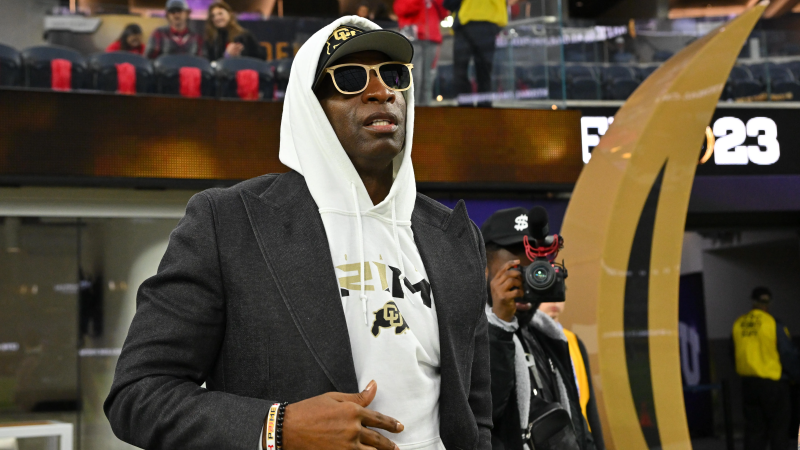Why jewelry has been an issue in Shilo Sanders' bankruptcy case: `Don’t wear it'
Colorado football standout Shilo Sanders recently appeared in an Instagram video wearing a long-sleeve black shirt with a certain piece of jewelry tucked underneath it − a necklace that was mostly concealed from the camera that filmed it.
It was a curious fashion move for him. He otherwise often has displayed his necklaces more like his father and coach, Deion Sanders. who wears expensive chains over his shirts, not underneath. That's the point in his case:
Why would you have this kind of jewelry if you’re not going to show it?
But in Shilo’s case, it turns out there are big reasons to bury the bling these days.
“He needs to be laying low because that (bling) is going to raise questions,” said Nicole Stanton, a bankruptcy attorney in Atlanta.
Blame it on his troubling legal situation. Shilo Sanders declared bankruptcy in October, hoping to discharge about $11 million in debt from a court judgment against him in Texas. It’s up to the court whether to discharge that debt. But if it denies the discharge, that judgment is owed to a man who has been closely monitoring any of Sanders’ possessions that could be sold to collect on it, including Shilo’s necklaces and especially the business deals that bring him income from his name, image and likeness (NIL).
Why Shilo Sanders should watch what he wears
The necklaces alone show some of the strange dimensions of this situation for Shilo Sanders, 24, who comes from a famous family that is known for its displays of wealth and luxury. Flashing bling is part of the Sanders family brand, including custom-made diamond necklaces and his quarterback brother’s famous wristwatch.

But because of the bankruptcy, Shilo now has incentive to look like he’s poor while still being truthful in disclosing all that he owns in court, as required by law.
It's because he’s being watched. The attorneys for the man seeking to collect on that judgment have been looking for public displays of his wealth and have questioned if he’s illegally hiding assets that could be sold to pay off his debt − which Sanders’ attorneys have denied.
So he needs to heed some advice, legal experts said − Disclose all you own in court but don’t give any potential debt collector more reasons to question where you’re getting the money to buy new things or whether certain necklaces you’re wearing were properly included in your court disclosures.
“If the bling-bling is his, you don’t wear it,” said Mechele Dickerson, a law professor at the University of Texas. “If the bling-bling is part of an NIL deal that is with a jeweler, he could give it back. You don’t own it anyway (in that case), so just give it back. A good lawyer would say you need to show up looking like a bum from now until the case is dismissed.”
His necklaces on loan
In the Instagram video, Shilo appears to touch the necklace at one point to make sure it’s tucked in place, though his intent for tucking it in is not known. The University of Colorado has said Shilo and his father declined comment on the pending bankruptcy case.
“Love how he tucked in the jewelry. Read the room,” one commenter said about it on Instagram.
How he discloses his jewelry has been an issue in his bankruptcy case from the start. In his initial Chapter 7 bankruptcy filing in October, he listed $478,000 in assets, including necklaces he valued at $75,000. His attorney then amended the value of his assets in December down to about $320,000 and removed the necklaces from the list of assets he owned, changing it to say he had $75,000 in necklaces that were on loan pursuant to an NIL deal with Saki Diamonds.
“They’re going to have to prove that,” said Stanton, who is not involved in the case. “How do you prove that? Affidavits. Testimony. Give it back.”
In late February, the trustee overseeing Sanders’ bankruptcy estate requested access to Sanders’ home to complete an inventory of his assets. The trustee also requested an inventory of the jewelry with the name, telephone number and addresses of the alleged owners, the trustee’s attorney said in a court filing in February.
“The Trustee further requested any contracts between the Debtor (Sanders), Debtor-affiliated entities and third parties that would show that the jewelry was used for promotional purpose,” the court filing said. “No information has been provided.”
Sanders’ attorney replied that Sanders “is cooperating in all respects” with the trustee, but it’s not clear if he provided what was sought. His attorney and Saki Diamonds didn’t return messages seeking comment.
His ‘valuable jewelry collection’
After Sanders’ attorney removed his necklaces from his list of assets, it raised eyebrows with attorneys for the man who is trying to collect on the judgment against him. That man is John Darjean, a security guard at Sanders’ old high school in Dallas.
Darjean sued Sanders in 2016, claiming Sanders assaulted him and caused him permanent injuries in an incident at the school in 2015, when Sanders was just 15 years old. Sanders disputed the allegations but didn’t show up for the trial in March 2022 after he dropped his attorneys in 2020 and then didn’t receive a notice in the mail about the trial because it went to his old address.

Without Sanders there to contest the allegations in person, the Dallas County court accepted Darjean’s version of what happened and awarded him the $11.89 million judgment by default. Sanders’s attorney said he didn’t even know about the judgment until last year but filed for bankruptcy soon after he did.
It was hard to miss after Darjean’s attorneys started aggressively pursuing debt collection efforts against Sanders and cited his displays of wealth on social media.
In a court filing in Texas on Oct. 19, 2023, Darjean’s attorney even took steps to get a court-appointed receiver to collect on the judgment, noting that Sanders hadn’t paid the debt but had shown plenty of property that could be subject to seizure to help satisfy the judgment.
“Mr. Sanders displays his valuable jewelry collection, which should be considered non-exempt (for seizure) as he wears it publicly and never mentions that such jewelry is owned by anyone else but himself or on loan from any sponsors,” Darjean’s attorney wrote in that filing. “In the below (Instagram) pages, Mr. Sanders is wearing diamond necklaces that are non-exempt assets and he is proud of it, too.”
The Instagram posts showed Sanders wearing flashy necklaces. Four days after that filing, Sanders filed for bankruptcy.
The big risk of hiding assets in a bankruptcy case
Sanders is seeking to have the debt discharged and has disputed whether the injury claimed by Darjean came from the alleged assault, according to court records. But Darjean, a former pro baseball player, is fighting that in court and says it should not be discharged because he said Sanders acted “willfully and maliciously” with respect to Darjean's alleged injuries – which would prevent such a discharge under the law.
If it’s not discharged, Sanders’ non-exempt possessions could be rounded up and sold to pay Darjean.
Sanders just has to be careful in the meantime. Though it might be tempting to hide non-exempt assets away from Darjean’s potential grasp, it’s against the law and could prevent a discharge of his debt if he ever transferred, destroyed or concealed such property within a year before the date of his bankruptcy filing in October. He also can’t do that after the filing if those assets were owned before then, such as jewelry or cash. Darjean’s attorney declined comment.
The mansion he never helped buy for Deion Sanders
By contrast, money earned after the filing is off-limits to creditors, said Angela Littwin, a bankruptcy expert and law professor at the University of Texas.
“But if a debtor used non-exempt cash from before he filed for bankruptcy to buy new assets, the trustee would try to trace the new assets to the old cash and thus access the new assets for the benefit of the creditors,” Littwin said.
Darjean is watching Shilo for that, too. In January, for example, Shilo’s older brother Deion Jr. posted a video on YouTube that suggested Deion Sanders’ sons were buying their father a new mansion in Colorado. Darjean’s attorneys saw it and said in a bankruptcy court filing that it “raises a plethora of questions regarding the resources of Shilo used in the acquisition, whether those resources were disclosed in the schedules or at the creditors meeting, and the timing of the deployment of such resources to acquire the property.”
The purchase of the mansion never happened, however. Shilo Sanders’ attorneys said the allegation of buying a house was based on “pure conjecture and media hype.”
The case goes on in the meantime as Darjean seeks to have the court determine that Sanders’ debt to him is not dischargeable. Those proceedings are expected to drag on well into the summer unless it’s settled before then.
Follow reporter Brent Schrotenboer @Schrotenboer. Email: bschrotenb@usatoday.com
Disclaimer: The copyright of this article belongs to the original author. Reposting this article is solely for the purpose of information dissemination and does not constitute any investment advice. If there is any infringement, please contact us immediately. We will make corrections or deletions as necessary. Thank you.







